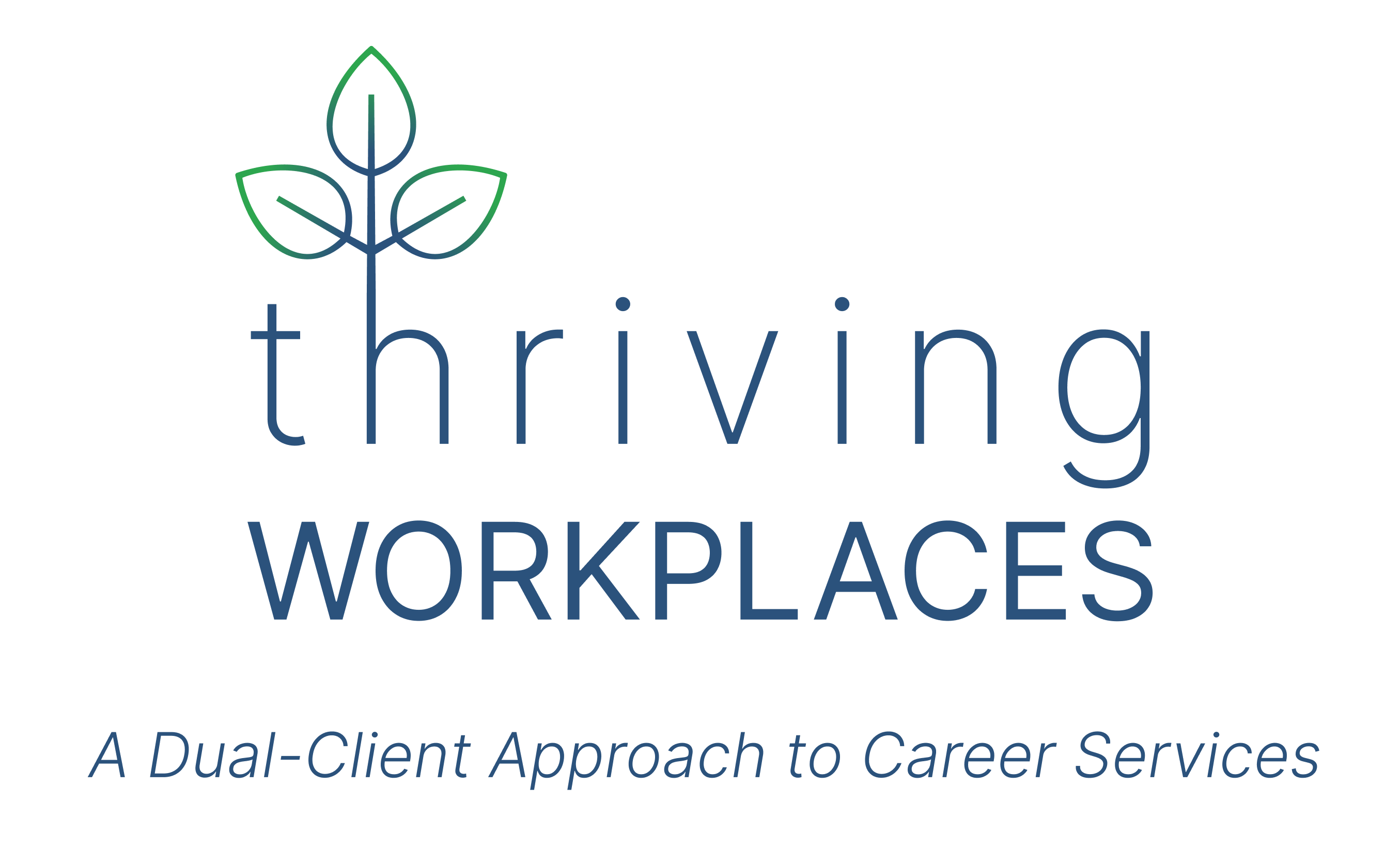About Thriving Workplaces
Project Genesis
Thriving Workplaces is a research initiative aimed at reimagining career services to meet the evolving needs of individuals, businesses, and communities.
Discovery
Our journey began with widespread consultation led by Blueprint as part of the Responsive Career Pathways (now called Reimaging Career Services) initiative and targeted research resulting in a series of papers highlighting the following challenges:
- Fail-first approach of most publicly funded employment services limits access and outcomes.
- Misaligned workplace expectations and high levels of turnover and economic strain, as small businesses struggle to find and keep workers while work seekers struggle to find aligned work.
With every challenge comes opportunity. The opportunity driving this research is:
What if we could drive innovation in publicly funded employment services to better align the expectations of work seekers, workers, and small businesses, contributing to robust workplace bargains, stronger retention, and thriving workplaces for all?
In the Discovery Phase of our research, we met with small business owners and workers across the province. We heard stories of small businesses struggling to survive and feeling the weight of their sense of responsibility to their communities. We heard stories of workers struggling to find work aligned to their needs and expectations. The stories all pointed to one important conclusion:

Although they are struggling to achieve it, both employers and workers want the same thing: a fair workplace bargain and the opportunity to thrive together at work.
We found that the workplace bargain between employers and their workers involves negotiating a set of Magnetic Factors related to their needs, offerings and mindsets, which can either attract employers and workers to each other or push them apart:
THE MAGNETIC FACTORS
The Magnetic Factors are:
These are the abilities that workers have to offer and that employers are seeking. These can include the technical skills required to do a job, as well as transferable skills (such as adaptability, collaboration, or communication), that can enhance performance across many jobs. When the skills and competencies of a worker align well with those needed by the employer, they are more likely to thrive together.
This refers to the balance between the capacity of a worker (what they can and want to do at work) and the amount of challenge their job entails. When a worker is highly capable but isn’t offered challenging work, they may feel bored or underutilized. Conversely, when a worker is given work that demands more than their capacity, they may feel overwhelmed. When a worker’s capacity and the degree of challenge in their work is aligned, they tend to be more engaged and productive.
These include contracted pay and benefits (the monetary compensation and formal benefits agreed to as part of an employment contract) AND may also include other benefits that are more informal and are often overlooked when considering the relative advantages and disadvantages of a position. Things like access to company tools, free lunches or snacks, and staff retreats are just a few examples of other benefits that may be important when considering alignment.
These refer to the ‘when’ and ‘where’ of work. We each have needs and preferences when it comes to work schedules and locations. Sometimes, an employer can offer flexibility in some aspects of the working arrangements; other times, the working arrangements are defined by the job and cannot be altered. An employer and worker will more likely create a thriving workplace together if their respective needs and preferences are understood and – as far as possible – aligned.
There are many reasons that motivate people to work. These reasons are unique to each person and may change over time as their beliefs, passions, and priorities evolve. What we value and really care about influences the decisions we make about where we choose to work and with whom. When the meaning and values of workers and employers are aligned, they are more likely to thrive together.
This is the overall atmosphere in a workplace based on the way people interact with each other and how work gets done. Each workplace has its own unique culture, shaped by both employers and other workers. When a culture aligns well with a worker’s preferences and priorities, that worker is more likely to thrive in the workplace.

Our Field Testing
We have been working with demonstration sites in Nova Scotia to test new approaches that help individuals and employers gain clarity on their strengths and stressors associated with each Magnetic Factor, and use that clarity to create more successful and sustainable employment interventions. Our aim is to support a shift from simply looking for work/workers, to finding strong matches and thriving together in the workplace.
Read about the results from Phase 1 of our field testing here.
Why this Research?
While there are pockets of excellence in Canada’s public employment services systems, there is enormous opportunity to extend reach and impact. By moving from a fail-first to a proactive dual-client service delivery model, this research has the potential to affect the socio-economic health of Canadians and our communities.
Starting in Nova Scotia
This is a pan-Canadian project, intended to inform policy across the country and internationally. We chose to start in Nova Scotia because of its:
- Forward-thinking approach to employer services in the public employment system
- Innovative leadership and service providers
- Trained and qualified career service providers
- Diverse communities and labour market, making it a microcosm of Canada
Businesses with less than100 employees employ 57.5% of Nova Scotia’s private sector workforce but contribute only about 27% of the province’s GDP ; the economic return on investment from addressing workforce churn and helping small businesses and their workers thrive in this way could be substantial.
Together, we can build a future where career services empower individuals, support businesses, and strengthen communities.


Funding
Thriving Workplaces is funded by the Future Skills Centre and overseen by Blueprint under the Reimagined Career Services initiative. The project is led by MixtMode Consulting (MixtMode) and the Canadian Career Development Foundation (CCDF), and operates in partnership with the Nova Scotia Departments of Labour, Skills and Immigration (LSI) and Economic Development (ED).
Click below to learn more about our project


